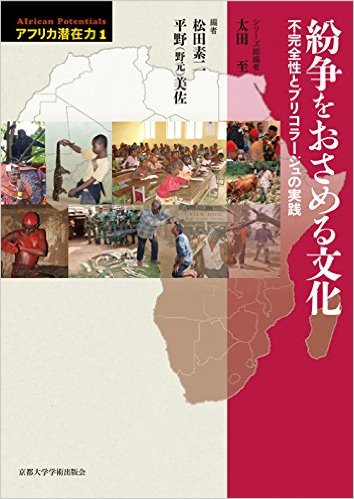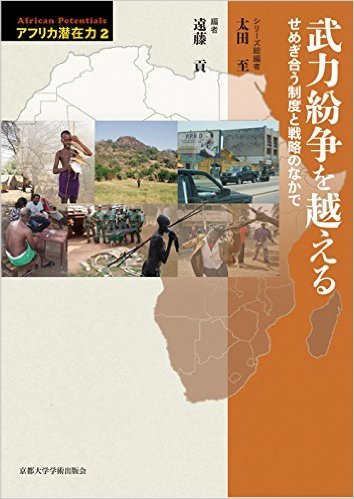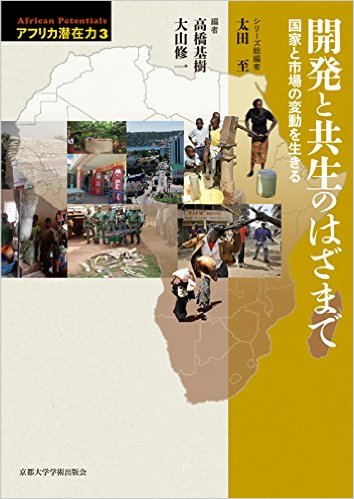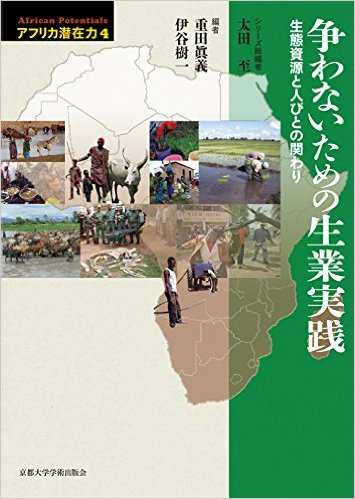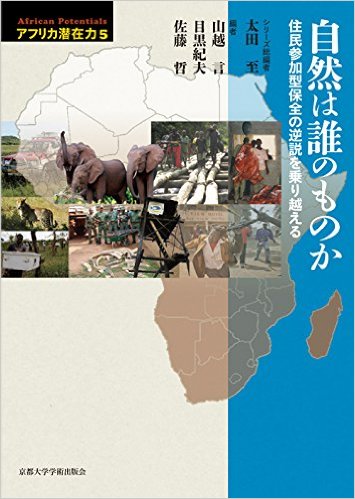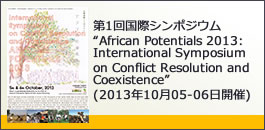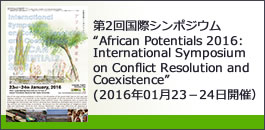[北東アフリカ・クラスター第4回研究会]「The Future of Local Knowledge in a Changing Africa: Exploring the State of Institutions of Mutual Assistance and Social Integration」(International Symposium of ZAIRAICHI Research Groupとの共催、2013年06月15・16日開催)
日 時:2013年6月15日(土)9:30~17:30、16日(日)10:30~12:00
場 所:京都大学稲盛財団記念館3階 中会議室
ワークショップ趣旨
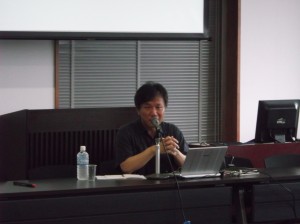
Local knowledge, also known as indigenous knowledge systems or ZAIRAICHI (在来知) in Japanese serve as source of livelihood and tool of survival for the rural communities in many parts of the word. They also serve local communities as medium of interaction (and of integration) with their social and natural environments. Local knowledge systems develop in areas with open ‘boundaries’, which allow their continuous creativity, innovation and evolution. These boundaries, however, are becoming more and permeable in the context of current global interconnectedness. These interconnections, interactions and resultant alterations of local knowledge systems are coming with both challenges and opportunities. Traditional community structures (e.g., kinship/linages) and associated knowledge systems are being weakened/challenged by newly introduced or reformed elements (e.g., religion, education, urbanization, political and other forms of identity formations). Yet, these new elements are also giving rise to new formations or layers of identification by linking people across the ‘traditional’ boundaries, which in turn may create broader opportunities for the members. It is in the context of these emerging challenges and opportunities that we intend to organize a symposium to discuss dynamism of local knowledge (ZAIRAICHI) in contemporary Africa. We plan to focus on aspect of local knowledge that connect people to people (social relations, association, mutual help and cooperation), which serve as fabrics of social integration and survival (livelihoods).
For the purpose of this symposium, we conceive knowledge as constituting both what people know, think and believe, and what they do (practices and institutions). Thus, we would like to explore ideas, norms, practices and institutions in motion (and continuities as well) in settings that are becoming increasingly plural. We examine contending issues, and patterns of contentions between the ‘old’ and the ‘new’ knowledge systems. We would also like to examine emerging patterns of local knowledge formations when adopting new elements or adapting to new situations. In this context, possible research themes may include, but not limited to the following areas: Changes and continuities in the areas of mutual help, cooperation, reciprocity and the state of social integration in a given community on/during: (1) marriage, wedding and child birth; (2) emotional and material assistances upon death/funeral; (3) illness, loss of property; destitution; (4) cooperative labor work on agriculture, construction of houses or other structures
プログラム
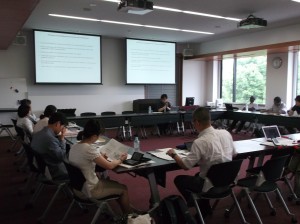
2013年6月15日(土)
09:30
Welcome and announcements
Opening Remarks (Shigeta Masayoshi)
09:45-12:50 Session I
When Diviner Meets Globalization: Local Knowledge and Its Creolization in the Wave of Capitalism
Yong-kyu Chang (Hankuk University of Foreign Studies)
Arsii Custom and Islam in Contest: Understanding the Discourse between Local and Extra-local Knowledge Systems over Traditional Systems of Mutual Assistance
Mamo Hebo Wabe (Addis Ababa University)
Interactions between Variation in Pottery Making and Mutual Assistance in Southwestern Ethiopia
Kaneko Morie (Kyoto University)
12:50-14:00 Lunch Break
14:00-15:00 Session II
Poster Presentations
Cooperative Fishing Activity by Women’s Groups in Zanzibar, Tanzania
Mariko Fujimoto (JSPS Research Fellow PD / Kyoto University)
Sport as a Tool of Survival: An Examination of the Practice of Competitive Cyclists’ Group in Kenya
Takuya Hagiwara (Kyoto University)
An Area Study of Indigenous Ox-Plow in Africa: A Focus on Working Efficiency of Tilling Practices among the Oromo of the Central Ethiopian Highlands
Toshikazu Tanaka (Kyoto University)
Conflict between Wage Labor and "Communal" Farming in Cash Cropping Practices by the Baka Pygmies of Southeastern Cameroon
Ohishi Takanori (Kyoto University)
15:00-15:30 Tea Break
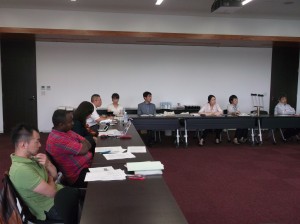
15:30-17:30 Session III
Dynamics of Indigenous Organisations: The Case of the Sengu Gathering of the Matengo People of Mbinga District, Tanzania
David Mhando (Sokoine University of Agriculture)
Sorghum Harvest, Rituals and Cooperation among the Hamer in Southwest Ethiopia
Samuel Tefera (Kyoto University)
Between Epidemiology and Local Knowledge: Exploring the Role of Health Workers in Supporting Households Affected with HIV in Southern Ethiopia
Nishi Makoto (Kyoto University)
2013年6月16日(日)
Session IV 10:30-12:00
General Discussions
[第13回公開ワークショップ/社会・文化ユニット第10回研究会]Michael Bollig 「Fragmentation, Cooperation and Power: The Institutional Dynamics in Natural Resource Governance in North-western Namibia」(第15回Kyoto University African Studies Seminar (KUASS)との共催、2013年05月14日開催)
日時:2013年5月14日 (火) 14:30~16:30
場所:稲盛財団記念館3階、318号室
題目:「Fragmentation, Cooperation and Power: The Institutional Dynamics in Natural Resource Governance in North-western Namibia(断片化と協同、そして権力 ―ナミビア北西部における自然資源管理に関する諸制度の動態-)」
発表者:Prof. Dr. Michael Bollig (Institute for Social and Cultural Anthropology, Vice-Rector for International Relations, Diversity and Academic Career, Universität zu Köln)
要旨
現在、共同で利用される資源の管理に関する理論では、以下のことが仮定されている。すなわち、もし共同体が、資源にアクセスする権利や資源を適切に管理する権利を与えられれば、そして共同体が資源の過剰な利用やただ乗り(コストを負担せずに利益だけを得ること)を防止できる制度をもてるならば、共同体は、持続的な資源管理の制度をつくり出 すことができるようになる。農村地域の共同体は、持続的で効率的な資源管理を実現するための基礎となりうるとみなされ、資源を私有化したり国家の管理のもとにおくというやり方に対して、共同体は有効な代替策となると考えられてきた。
ナミビアでは近年、農村地域における資源のコミュナルな管理をめざして包括的な法改正がおこなわれ、土地の持続的な利用と農村の発展を同時に達成するための制度的な枠組みを創出する試みがなされてきた。そして政府は農村の共同体に対して、さまざまな権利を委譲したが、そのやり方があいまいで断片的なものであったために、異なる主体のあいだで土地所有権が重複してしまうという多くの事例が発生した。
現在、農村共同体は、こうして出現した「新しいコモンズ」をどのように制度化するのかという課題に取り組んでいる。その制度は、以前から存在する共同体的な制度のうえに接合されるのだが、同時に、国家による法律の制定と NGO の参画にも影響を受けることになる。
この発表では、こうした制度が形成されていくプロセスを論ずる。その際には、とくに、集団(共同体)の境界を決める必要性から生じる諸問題、新たに決められた土地の共同所有体制のもとでおこなわれる監視と制裁から発生する問題点、そして、CBNRMがたどってきたさまざまな軌跡にはどのようなイデオロギーの土台があるのかに焦点をあてる。
ABSTRACT
Contemporary theoretical accounts of common pool resource management assume that communities are able to develop institutions for sustainable resource management if they are given security of access and appropriate rights of management, and if they can develop institutions that prevent free-riding and over-exploitation. Rural communities have been conceptualized as cornerstones of sustainable and efficient resource management: as a viable alternative to privatizing resources or putting them under state administration. In recent years comprehensive legal reforms of communal rural resource management in Namibia have sought to create an institutional framework linking sustainable land use and rural development. The state, however, ceded rights to communities in an ambiguous and fragmented manner, creating a number of instances of overlapping property rights. Nowadays communities grapple with the challenge of instituting these “new commons”, which are grafted onto earlier communal institutions, but also shaped by state legislation and the engagement of non-governmental organizations. This presentation describes the process of institutional development, focusing on the challenges arising from the necessity to define group boundaries, the issues arising from monitoring and sanctioning within a newly defined common property regime, and the ideological underpinnings of different trajectories of community based natural resource management (CBNRM).※ 講演及び配布資料は英語を使用いたします。日本語資料は発表要旨のみとなります。
共催:
アフリカ地域研究資料センター
科研基盤(S)「アフリカの潜在力を活用した紛争解決と共生の実現に関する総合的地域研究」(代表者:太田至)
この講演会は、京都ケルン姉妹都市提携50周年記念事業のひとつとして実施します。
[社会・文化ユニット第10回研究会/第13回公開ワークショップ]Michael Bollig 「Fragmentation, Cooperation and Power: The Institutional Dynamics in Natural Resource Governance in North-western Namibia」(第15回Kyoto University African Studies Seminar (KUASS)との共催、2013年05月14日開催)
日時:2013年5月14日 (火) 14:30~16:30
場所:稲盛財団記念館3階、318号室
題目:「Fragmentation, Cooperation and Power: The Institutional Dynamics in Natural Resource Governance in North-western Namibia(断片化と協同、そして権力 ―ナミビア北西部における自然資源管理に関する諸制度の動態-)」
発表者:Prof. Dr. Michael Bollig (Institute for Social and Cultural Anthropology, Vice-Rector for International Relations, Diversity and Academic Career, Universität zu Köln)
要旨
現在、共同で利用される資源の管理に関する理論では、以下のことが仮定されている。すなわち、もし共同体が、資源にアクセスする権利や資源を適切に管理する権利を与えられれば、そして共同体が資源の過剰な利用やただ乗り(コストを負担せずに利益だけを得ること)を防止できる制度をもてるならば、共同体は、持続的な資源管理の制度をつくり出 すことができるようになる。農村地域の共同体は、持続的で効率的な資源管理を実現するための基礎となりうるとみなされ、資源を私有化したり国家の管理のもとにおくというやり方に対して、共同体は有効な代替策となると考えられてきた。
ナミビアでは近年、農村地域における資源のコミュナルな管理をめざして包括的な法改正がおこなわれ、土地の持続的な利用と農村の発展を同時に達成するための制度的な枠組みを創出する試みがなされてきた。そして政府は農村の共同体に対して、さまざまな権利を委譲したが、そのやり方があいまいで断片的なものであったために、異なる主体のあいだで土地所有権が重複してしまうという多くの事例が発生した。
現在、農村共同体は、こうして出現した「新しいコモンズ」をどのように制度化するのかという課題に取り組んでいる。その制度は、以前から存在する共同体的な制度のうえに接合されるのだが、同時に、国家による法律の制定と NGO の参画にも影響を受けることになる。
この発表では、こうした制度が形成されていくプロセスを論ずる。その際には、とくに、集団(共同体)の境界を決める必要性から生じる諸問題、新たに決められた土地の共同所有体制のもとでおこなわれる監視と制裁から発生する問題点、そして、CBNRMがたどってきたさまざまな軌跡にはどのようなイデオロギーの土台があるのかに焦点をあてる。
ABSTRACT
Contemporary theoretical accounts of common pool resource management assume that communities are able to develop institutions for sustainable resource management if they are given security of access and appropriate rights of management, and if they can develop institutions that prevent free-riding and over-exploitation. Rural communities have been conceptualized as cornerstones of sustainable and efficient resource management: as a viable alternative to privatizing resources or putting them under state administration. In recent years comprehensive legal reforms of communal rural resource management in Namibia have sought to create an institutional framework linking sustainable land use and rural development. The state, however, ceded rights to communities in an ambiguous and fragmented manner, creating a number of instances of overlapping property rights. Nowadays communities grapple with the challenge of instituting these “new commons”, which are grafted onto earlier communal institutions, but also shaped by state legislation and the engagement of non-governmental organizations. This presentation describes the process of institutional development, focusing on the challenges arising from the necessity to define group boundaries, the issues arising from monitoring and sanctioning within a newly defined common property regime, and the ideological underpinnings of different trajectories of community based natural resource management (CBNRM).※ 講演及び配布資料は英語を使用いたします。日本語資料は発表要旨のみとなります。
共催:
アフリカ地域研究資料センター
科研基盤(S)「アフリカの潜在力を活用した紛争解決と共生の実現に関する総合的地域研究」(代表者:太田至)
この講演会は、京都ケルン姉妹都市提携50周年記念事業のひとつとして実施します。
[第3回アフリカの紛争と共生セミナー]「2012年度海外派遣者報告会」(2013年05月11日開催)
日時:2013年5月11日(土) 15:00-17:00
場所:京都大学稲盛財団記念館3階中会議室
プログラム
15:00-15:40
福井美穂(お茶の水女子大学グローバル協力センター特任講師)
人間の安全保障の視座に基づくポストコンフリクト期のジェンダーに基づく暴力(Gender-Based Violence: GBV) 問題の研究と実際的対応の模索
15:40-16:20
久田信一郎(京都大学アフリカ地域研究資料センター研究員)
P3DMを活用した土地紛争の重層的な関係の解明
―エチオピア南西部高地農耕民アリの事例―
16:20-17:00
井手上和代(神戸大学大学院国際協力研究科博士後期課程)
アフリカにおける資本市場と企業の資金調達
要旨
人間の安全保障の視座に基づくポストコンフリクト期のジェンダーに基づく暴力(Gender-Based Violence: GBV)問題の研究と実際的対応の模索
福井美穂(お茶の水女子大学グローバル協力センター特任講師)
本研究は、ポストコンフリクト期における国際的支援者による被支援者に対するGBV対策について、人間の安全保障という被害者中心の視座を導入することで、さらなる予防の促進および法的および行政処分の徹底、そして被害者の支援・保護の強化について、より具体的な政策提言および組織的対策に関する提言につながる研究を行うことを目的としている。特に事件直後の、仮想加害者の所属する多様な組織の行うべき予防対策および被害者支援を検討する。フィールド調査は、被害者支援の現状と、被害者中心の視座を導入した被害者支援内容の理解のためポストコンフリクト期にGBVを経験したシエラレオネおよびリベリアで調査を行い、ポストコンフリクトから開発への移行期にあるシエラレオネでは政府主導のGBV対策の成果と被害者支援の現状を、未だ国連PKOが展開するリベリアでは、国連を主体とする最新のGBV対策を調査した。ポストコンフリクト期からGBV被害者支援されることにより開発期に続くアフリカの人間の安全保障に関わる「潜在力」を模索する。その調査内容から、加害者の所属組織や法的地位にかかわらず被害者が支援を受けられるよう、加害者所属組織を中心とした国際社会による被害者支援の在り方を考察する。
P3DMを活用した土地紛争の重層的な関係の解明
―エチオピア南西部高地農耕民アリの事例―
久田信一郎(京都大学アフリカ地域研究資料センター研究員)
エチオピアは、1991年5月に社会主義政権が倒されて、1996年からエスニック・グループ単位の連邦制となった。本事例研究は、アリが住む南部諸民族州、南オモゾーン、南アリ郡、ドルドラ村内のガラメルティ集落にて行なった。この集落は、世帯数が165(人口890人)で、標高が2400-3200mの高地にあり、面積が約2キロ四方で、その東側がドルドラ森林に接している。主な生業は、農耕で大麦、小麦、豆類を栽培し、牛、羊などの家畜を肥育している。これらの家畜は、耕作期間中にドルドラ森林内にて牧童に連れられて放牧されている。アリでは、1990年代初めに急激な人口の増加と家畜の市場価格高騰による肥育数の増加が起こった。調査地では、これと時を同じくして高地の森林部分の開墾が起こった。耕作地を隣接するもの同士の境界線の争いや、家畜が他人の土地で草や作物を荒らす被害の調停は、村の下部組織である集落を単位として選ばれたリーダーか、その村内の長老が行なってきた。それでも解決できないときには、行政組織であるカバレ(村)の評議会に調停や裁決を仰いできた。本調査では、ガラメルティ集落の上層部にて開墾が行なわれたにもかかわらず森林存続に影響を与えた要因を明らかにする。
私は2008年5月よりこの地域のアリが住む高地にて住民参加型手法によって作成した立体地形モデルを使って土地利用の視覚化をおこない森林部分の開墾地と開墾者どうしの親族・姻戚関係について調査してきた。耕作地の開墾と森林利用の変化を把握するために、立体地形モデルを使ったワークショップとフィールドワークで得た情報をもとに、親族関係作成アプリケーション(Alliance3.3)を使って親族データベースを作成した。土地利用と親族関係というふたつの属性の違うデータを重ね合わせることにより、誰が誰とどのような関係を持ち、どの部分の森林の開墾を行なったかを把握した。それをもとに森林開墾を止めるために果した長老の戦略について考察した。
その結果、ガラメルティ集落の住民は、血縁の親族単位および姻戚関係を持ち良好な親族・姻戚関係を維持しつつ森林開墾を行ったことを見いだした。1996年以降の森と耕作地の境界は、行政が環境保全や森林資源保全のために指導して定めたのではなく、この集落の長老等が、行政にたいして森林と隣接する地区の住民による行き過ぎた開墾の中止を要請して定めたことが明らかになった。
アフリカにおける資本市場と企業の資金調達に関する一考察
―モーリシャスの製糖業による資本蓄積と工業化における資源移転の分析より―
井手上和代(神戸大学大学院国際協力研究科博士後期課程)
1968年の独立までにオランダ、フランス、イギリス3カ国の植民地を経験したモーリシャスは、砂糖輸出に依存した経済構造を持ち、製糖産業は国の主幹産業であった。一方、国内では高い人口増加率や深刻な財政状況を抱えており、産業の多角化を図り経済発展することが政府にとって重要な政策課題であった。その後1970年の輸出加工区(Export Processing Zone: EPZ)の設置により、一次産品輸出依存の経済から脱却し、アフリカにおいて輸出指向工業化により高い経済成長を遂げた成功例として“Mauritian Miracle”と称された。
モーリシャスにおける植民地支配の経験や外国資本の存在は、国内の人口構成や経済構造に決定的な影響を与えていると考えられるが、事前の調査より、モーリシャスの経済成長を支えた要因の一つとして、フランス植民地時代より続く砂糖の輸出による国内の資本蓄積がEPZにおける繊維・衣料産業への投資を可能にしたと想定される。本研究では、製糖業者の発展過程および、EPZ企業や金融部門との関連性を明らかにすることで、上記の仮説を検証し、さらにその結果を踏まえ、アフリカにおける資本市場の整備を考える上で企業の所有構造の寡占が一般的であるアフリカ社会において、単に企業発展のための資金供給ではなく、国の包括的な成長の為の、金融システムの在り方を考察することを目的とする。
[第11回全体会議]「今後の研究方針の打ち合わせ」(2013年5月11日開催)
日 時:2013年5月11日(土)13:00~14:30
場 所:京都大学稲盛財団記念館3階中会議室
今回の全体会議では、各ユニットとクラスターの世話人と副世話人があつまり、今後の研究活動について、以下の議論をおこなった。
議題
(1)2013年10月に京都で開催する国際シンポジウム
- シンポジウムのタイトルは、African Potentials 2013: International Symposium on Conflict Resolution and Coexistence(和文のタイトルはつけない)
- このシンポジウムは、10月4日(金)、5日(土)、6日(日)の三日間で開催する
- 基調講演は、フレッドリック・クーパー氏(Fredrick Cooper:ニューヨーク大学)
- 4つのセッションをもうけ、ひとつのセッションは、基本的に4人の発表者+コメンテータで構成
- たとえば「日本人2人+アフリカ人2人」や「日本人2人+アフリカ人1人+欧米人1人」などの構成
- 発表は1人の発表者に対して、質疑応答を含めて30分を予定。30分×4人=120分、コメント10分、討論20分として、ひとつのセッションが150分
- 発表者には、300単語ほどのアブストラクトを提出してもらう。締め切りは7月31日
- 発表者には、3000~5000words程度のプロシーディング用ペーパーを提出してもらう。締め切りは9月3日。そして、プロシーディングを10月4日に配布する
(2)カナダ・アフリカ学会の参加報告
- カナダ・アフリカ学会は、2013年5月1日~3日に開催された
- 大会の全体のテーマは、”Africa Communicating: Digital Technologies, Representation, and Power”
- 本研究プロジェクトでは、高橋基樹(神戸大学)、羽渕一代(弘前大学)、内藤直樹(徳島大学)、Othieno Nyanjom(ケニア、Kenya Institute for Public Policy Research and Analysis)の4つの発表と、コメンテータのJohn Galaty (McGill University) によってひとつのセッションを構成して、研究成果を発表した。
- セッションのテーマは、”Social Cohesion in Kenya: Changes in the State, Markets and Communication”であり、多数の参加をえて、活発な議論をかわした
(3)7月13日(土)の全体会議のテーマ「南部スーダン」
- 今年度には、「第3回アフリカの紛争と共生、国際フォーラム」を南スーダンの首都ジュバで開催するが、それに先立って、7月13日(土)の全体会議では、「南スーダンにおける平和構築」をテーマとする研究会を開くことにし、栗本英世(大阪大学)がオーガナイザーとして、研究会の概要を説明した。
(4)若手研究者のフィールドワーク支援
- 今年度にも、若手研究者のフィールドワークを支援することにした。
(5)2012年度の実績報告、および2013年度の交付申請書提出を提出した。
(6)今年度の全体会議、各ユニット・クラスターの研究会の日程を確認した。
(7)その他
[東アフリカ・クラスター第4回研究会]波佐間逸博「牧畜家畜―人間の共生的な関係:東ナイロート牧畜社会の個体主義」(2013年05月11日開催)
日 時:2013年5月11日(土) 10:00~12:00
場 所:京都大学稲盛財団記念館 小会議室1
プログラム
「牧畜家畜―人間の共生的な関係:東ナイロート牧畜社会の個体主義」
波佐間逸博(長崎大学)
報告
波佐間氏は、ウガンダ北東部の牧畜民カリモジョンとドドスにおける人―家畜関係、人―人関係の特徴について論じた。波佐間氏はまず人―動物関係をめぐる既存の議論を批判的に検討したあとで、家畜の特定個体が人間からの名前の呼びかけに適切に反応しており家畜が人間を個体識別していることなどから、この地域の牧畜民に特徴的な家畜―人間関係の特徴として「個体主義的な共生関係」を抽出した。さらに、近隣集団とのレイディングの事例を検討しながら、牧畜民が他者を「敵/仲間」といった集団範疇に回収するのではなく、対面的な相互行為にもとづき他者をそのたびごとに個別化していることに注目した。そして、人―家畜関係、人―人関係に共通する牧畜民に特徴的な他者に対する態度として「かけがえのない個へのアテンション」をあげた。討論の場では、西洋的な「個人性」と英語では同じ語で示される「個体性(individuality)」という語が牧畜民の特徴を表す際に適切なのか、付与される「個体性」には、個別の家畜ごと、他者ごとに濃淡があるのではないか、人―家畜関係における「個へのアテンション」と人―人関係における「個へのアテンション」の関係はどのようなものか、といった点が論じられた。(佐川徹)
[南部アフリカ・クラスター第5回研究会]「国際フォーラム(ハラレ)の成果のとりまとめと出版にむけた打合せ」(2013年4月6日開催)
日 時:2013年4月6日(土)
場 所:京都大学稲盛記念館 3階 318室
プログラム
国際フォーラム(ハラレ)の成果のとりまとめと出版にむけた打合せ
報告
2012年12月7日から9日にかけて、ジンバブエ・ハラレで開催された第2回国際フォーラム(https://www.africapotential.africa.kyoto-u.ac.jp/research_activities/4016.html)の発表者が集まり、発表と討議の内容にもとづいた英文原稿を持ち寄りました。国際フォーラムのオーガナイザーのひとり峯先生を中心に、原稿の読み合わせとお互いの原稿に対する講評をおこない、成果本の出版にむけて今後の修正の方向性を検討いたしました。なお、この第5回南部アフリカ・クラスターの研究会は、ハラレの国際フォーラムに参加した関係者のみで開催いたしました。(大山修一)
[第3回公開講演会/第10回全体会議]瀬谷ルミ子「アフリカの平和構築:現場からの課題と今後の選択肢」(2013年03月23日開催)
日 時:2013年3月23日(土)14:00~16:00
場 所:京都大学稲盛財団記念館3階大会議室
プログラム
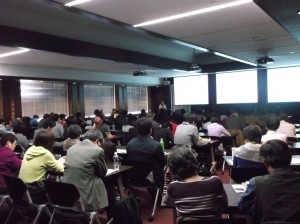
14:00-14:15 趣旨説明と講師紹介 遠藤貢(東京大学教員)
14:15-15:15 「アフリカの平和構築:現場からの課題と今後の選択肢」
瀬谷ルミ子(日本紛争予防センター事務局長)
15:15-16:00 質疑と討論
16:30-17:30 瀬谷氏とプロジェクトメンバーとの意見交換会
要 旨
現代アフリカの多くの地域では、さまざまな紛争をどのように終結させ、紛争によって解体・疲弊した社会をどのように再建してゆくのか、という困難な課題に直面しています。アフリカの現場で紛争解決と平和構築の仕事にたずさわってこられた瀬谷ルミ子氏に、この問題について具体的な事例をとおしてお話しいただきました。
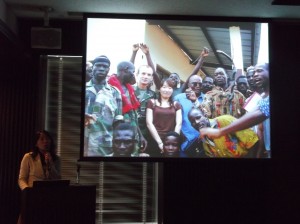
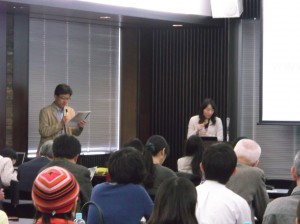
[第10回全体会議/第3回公開講演会]瀬谷ルミ子「アフリカの平和構築:現場からの課題と今後の選択肢」(2013年03月23日開催)
日 時:2013年3月23日(土)14:00~16:00
場 所:京都大学稲盛財団記念館3階大会議室
プログラム

14:00-14:15 趣旨説明と講師紹介 遠藤貢(東京大学教員)
14:15-15:15 「アフリカの平和構築:現場からの課題と今後の選択肢」
瀬谷ルミ子(日本紛争予防センター事務局長)
15:15-16:00 質疑と討論
16:30-17:30 瀬谷氏とプロジェクトメンバーとの意見交換会
要 旨
現代アフリカの多くの地域では、さまざまな紛争をどのように終結させ、紛争によって解体・疲弊した社会をどのように再建してゆくのか、という困難な課題に直面しています。アフリカの現場で紛争解決と平和構築の仕事にたずさわってこられた瀬谷ルミ子氏に、この問題について具体的な事例をとおしてお話しいただきました。


[社会・文化ユニット第9回研究会/第12回公開ワークショップ]Wilbert Zvakanyorwa Sadomba「The Urban Working Class Dimensions of Zimbabwe’s War Veterans Revolution: New Empirical Evidence from the Informal Sector」(第12回Kyoto University African Studies Seminar (KUASS)との共催、2013年03月19日開催)
日時:2013年3月19日 (火) 16:00~18:00
場所:京都大学稲盛財団記念館3階小会議室2
題目:「The Urban Working Class Dimensions of Zimbabwe’s War Veterans Revolution: New empirical evidence from the informal sector」
発表者:Dr. Wilbert Zvakanyorwa Sadomba (Department of Sociology, University of Zimbabwe)
要旨
The revolution that has been spearheaded by Zimbawean veterans of the 1970s guerrilla war has pushed Africa’s political, social and economic struggles to new horizons. It raises fresh philosophical questions about postcoloniality of and in Africa. The revolution, rooted as it is in the liberation struggle that culminated in a protracted war from the1960s to 1979, lay a political foundation that continues to shape philosophical thought and social practice of this small nation, with ripple effects on the whole continent and perhaps other developing nations across the world. The essence of this revolution is its combined challenge of neo-colonialism and imperialist domination supported by settler economic hegemony. There are four distinct rural and urban movements on which this revolution was anchored, viz. the land, informal mining, housing cooperatives and informal industry and trade movements. A combination of the two books focus on the land and housing cooperatives. Of the five the land movement was the most popularised and internationalised but it was by no means the most dramatic or even the most sustainable but on the contrary it was the most vulnerable to neo-colonial forces and imperialist attacks. However it was also the most symbolical. Current studies on the informal industrial movement add more empirical evidence to this theorisation. Future studies will pursue informal mining as part of the war veterans revolution. The address will illustrate how the war veteran revolution generated a centrifugal force that span the movements and it will discuss relative successes and failures of these in the current political stalemate of the country.(※講演は英語で行われます。日本語通訳および日本語資料はございません。事前申込不要/参加無料。どなたでもご参加いただけます。)
共催:
・京都大学アフリカ地域研究資料センター
・科研基盤(S)「アフリカの潜在力を活用した紛争解決と共生の実現に関する総合的地域研究」(代表者:太田至)
